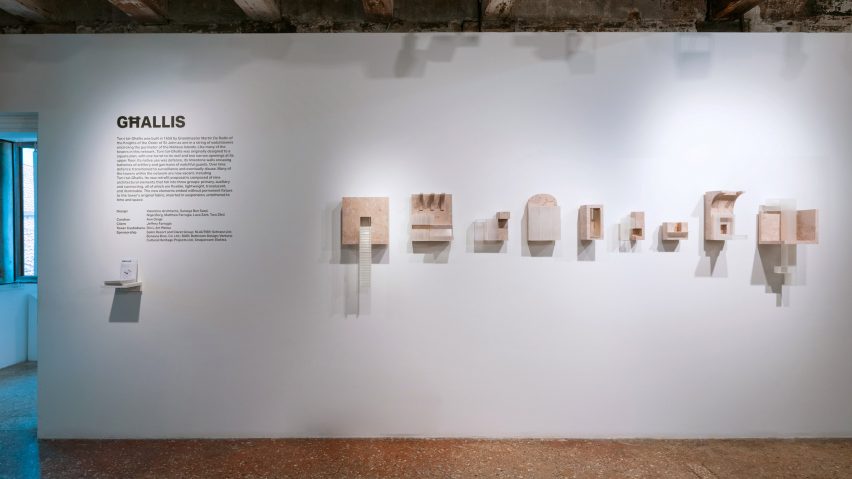Valentino Architects and curator Ann Dingli have presented a proposal to retrofit a historic fortification at the Venice Architecture Biennale to suggest alternative methods of conservation in the face of Malta's rapid development.
Curated by Dingli, the small-scale exhibition was part of the Time Space Existence showcase and featured an abstracted plan to retrofit the 17th-century watchtower on the north-eastern shore of Malta.
"The Għallis watchtower in isolation is not remarkably significant – it's been vacant for years," Dingli told Dezeen. "But it belongs to a network of micro-fortifications that were built along the edge of the islands in the 17th century and tell a part of the islands' wider military story."
"Today the tower is a marker along the coast and not much more," she continued. "The point of the exhibition is to re-charge its significance by introducing new usability and graduating it from just a visual landmark to a habitable space."
With its proposal, the team suggests changing the use of the building to create a multi-use structure that can be utilised in numerous ways.
"The design reverses the exclusive nature of the tower – conceived as a fortress designed to keep people out – to an inclusive building that invites people in," explained Valentino Architects.
"Its programme is flexible, adapting to three permutations that allow for varying degrees of private use and public access."
The tower was showcased at the biennale to draw attention to a wider issue facing Malta – the commercialisation of its historic buildings.
The team aimed to demonstrate that historic buildings could be converted into useable structures rather than being restored as empty monuments.
"Heritage architecture in Malta has a strong focus on preservation of building fabric and less so on functional innovation," said Dingli.
"This means heritage buildings very often serve one programme – usually as museums of themselves or as institutional buildings – and as a result become inaccessible or redundant to everyday use," she continued.
"This design moves away from heritage as a product and towards heritage as useful space."
The team hopes that the exhibition will draw attention to the rapid development of Malta, which it says is happening at the expense of the country's existing buildings.
"The islands are on a seemingly unstoppable trajectory of hyper-development," explained Dingli. "Malta is the most densely populated country in the EU, and one of the most densely populated countries in the world."
"Its built environment hasn't met this intensity with the right blend of retrofit and newbuild development – the former exists in extreme scarcity, despite a huge stock of existing building fabric crying out to be re-used in smarter ways," she continued.
Although the exhibition focuses on a historic fortification, the team believes that prioritising reuse over rebuilding should be implemented across the country.
"The argument for conservation needs to be extended to any form of building stock, not just heritage buildings," explained Valentino Architects.
"Demolishing existing buildings to make way for new ones is almost never sustainable," they continued. "When there is no alternative but to remove a building, we need to advocate for dismantling as opposed to demolishing."
"Materials such as Malta's local yellow limestone – which has traditionally carved out the architectural identity of our island – is a finite resource that needs to be both protected and used," they added.
Alongside the Għallis exhibition, the Time Space Existence show presented work by architects, designers and artists from 52 different countries in venues across the city. These included a tea house made from food waste and a concrete emergency housing prototype developed by the Norman Foster Foundation and Holcim.
The photography is by Federico Vespignani.
Time Space Existence takes place from 20 May to 26 November 2023 at various locations across Venice, Italy. See Dezeen Events Guide for an up-to-date list of architecture and design events taking place around the world.

